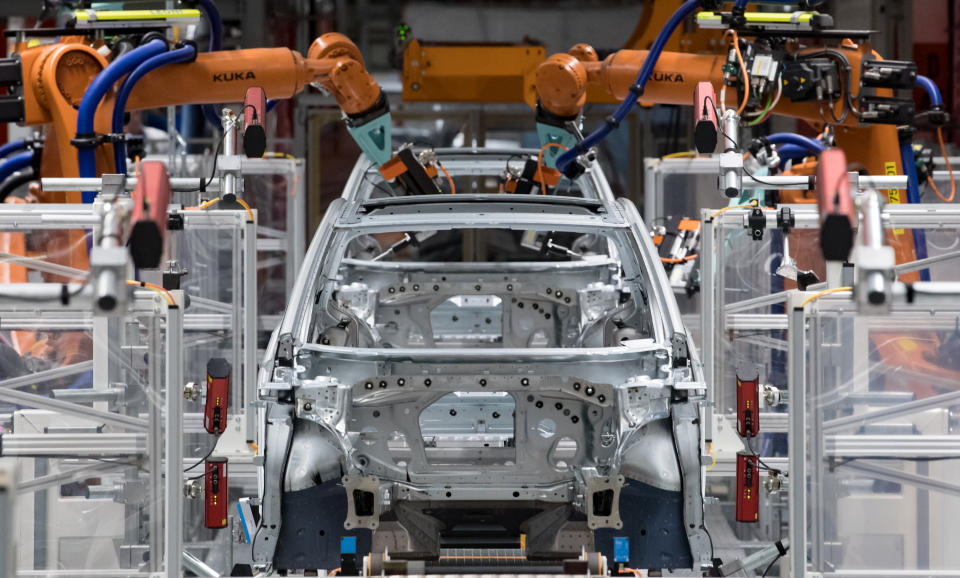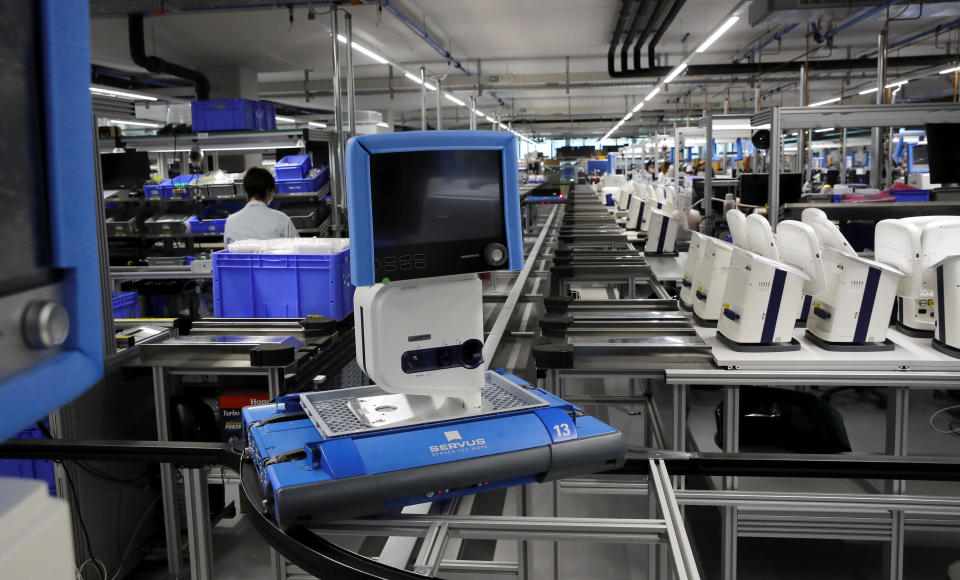Coronavirus: Car industry pivot to ventilators isn't the miracle solution to global shortfall

The car industry has inadvertently been positioned as the answer to how to plug the gaping hole in the world’s ventilator supply.
As the coronavirus pandemic rages across the US and Europe, hospitals are facing a serious shortage of medical equipment, especially ventilators, which offer life-saving support to those whose lungs have been damaged by the respiratory illness. Respirators — masks that protects medics — are in equally short supply.
With a wealth of 3-D printing capabilities, manufacturing resources, and production power, governments across the globe have been reaching out to the car industry for support. Many of the world’s automotive giants have responded saying they will look into how they can help manufacture medical gear to tackle the shortfall in equipment.
Ventilators are, however, sophisticated pieces of equipment and making them is not easy. It also comes with strict regulator approval standards and legal liability.
While carmakers’ offers of help may be laudable, they simply might not have the time and the ability to retool factories, already set up for very specialised car manufacturing, and get up to speed to make machines like ventilators.
Who’s in?
Ford, General Motors and Tesla are being given the go ahead to make ventilators and other metal products, FAST! @fema Go for it auto execs, lets see how good you are? @RepMarkMeadows @GOPLeader @senatemajldr
— Donald J. Trump (@realDonaldTrump) March 22, 2020
US president Donald Trump tweeted on Sunday that car companies would get approval to make “ventilators and other metal products.”
A few days later, Ford Motor Company (F) announced was teaming up with 3M to mass-produce Powered Air-Purifying Respirators at one of its car plants, and working on a new design using its parts, including seat fans from the F-150 pickup truck. It is also working with GE Healthcare to make a simplified version of GE’s current ventilator, which it said could be produced at a Ford manufacturing site.
General Motors (GM) also offered to help, and Tesla (TSLA) CEO Elon Musk ordered 1,200 ventilators from China to be flown to Los Angeles for hospitals. Italian-US car group Fiat Chrysler (FCA.MI) said it would produce a million face masks a month for medical workers, and emergency services in North America.
Across Europe, car companies have rushed to offer their help. McLaren and Nissan (NSANY) are heading up industrial consortia to respond to British prime minister Boris Johnson’s appeal that different sectors of industry harness combined technical expertise and manufacturing muscle to make ventilators for the National Health Service (NHS).
Vauxhall in the UK told the Guardian that it had offered its Ellesmere Port plant for assembly and 3-D printing.
In Germany, Volkswagen (VOW.DE) announced this week that it was having €40m (£35.3m, $43.33m) worth of medical materials— including face masks, gloves, disinfectants, thermometers, and protective clothing— sent from China to Germany for hospitals and medical staff. “We are taking advantage... of our global logistics chains to ensure that this donation reaches doctors and hospitals as quickly as possible,” said VW chief executive Herbert Diess in a statement.
It’s not that simple

While car makers are experts when it comes to high-tech engineering and volume production, it is not clear how it would be feasible for them to re-tool factories and train workers to start making specialised machines like ventilators.
On top of that, Europe’s car plants have all been shut for the next weeks or longer, after international supply chains stopped functioning properly. Volkswagen and Mercedes-Benz are sending tens of thousands of workers home for the duration.
READ MORE: VW and Daimler to put tens of thousands onto reduced hours as plants close
A Jaguar Land Rover spokesperson told Yahoo Finance UK via email that the government has approached them “for help with the production of ventilators” and discussions were ongoing, but declined to comment on the feasibility or logistics of converting plants for ventilator production.
“We are considering using our 3D capabilities to help with the production of medical equipment, however, we are not quite there yet,” a Volkswagen spokeswoman told Yahoo Finance UK. “We are still investigating what exactly is needed and if that's really feasible.”
Ansgar Meroth, a professor of automotive systems engineering at Hochschule Heilbronn doubts the feasibility of automotive firms starting up ventilator production. Obviously, he notes, machines needed to make ventilators or even just masks are vastly different to those in automotive plants. Those current plants comprise of huge sheet-metal stamping machines, thousands of assembly robots, paint shops and manual assembly floors — they’re not geared to make ventilators, naturally.
Not to mention the skill-set involved. “Would you trust in a ventilator that is saving your dad's life, made by the locksmith in your village? I guess not,” Meroth said.
“Ventilators (in mass production) are not only built on highly specialised machines but also, you need to follow sophisticated processes in disinfection, reliability e.t.c.,” Meroth told Yahoo Finance UK. “It takes years to qualify personnel and equipment for building medical devices and to get the according licenses.”
Robert Harrison, automation systems professor at the University of Warwick, said setting up production lines to produce ventilators “would be a significant task, perhaps taking many months,” and that training people, plus sourcing all the various components, would pose significant challenges.
Ventilator companies too have underlined the complexity of making these life-saving machines.
“These are extremely sensitive machines with not only a lot of hardware, but also a lot of software,” Jens Hallek, CEO of Hamilton Medical told Wired. “If one of the components does not work correctly, the whole machine shuts down and cannot be used anymore.”
Craig Thompson, head of products at medical devices firm Penlon also expressed skepticism. "The idea that an engineering company can quickly manufacture medical devices, and comply with the rules, is unrealistic because of the heavy burden of standards and regulations that need to be complied with," Thompson told the BBC, adding that the focus right now “should be on existing medical device companies increasing supply of ventilators.”

